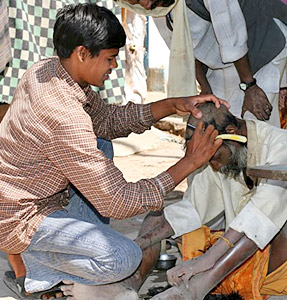 Napita Nau is the barber caste who was also known as Hajam. The occupation of a barber in India is far wider in its operations than in England. The work of Napita Nau is to shave the head as well as the face. He peels the nails both of hands and feet, cleans the ears, bleeds and cups.
Napita Nau is the barber caste who was also known as Hajam. The occupation of a barber in India is far wider in its operations than in England. The work of Napita Nau is to shave the head as well as the face. He peels the nails both of hands and feet, cleans the ears, bleeds and cups.
In addition he is a very important personage in Hindu families, on certain public occasions. At a marriage feast, and also at other festivals, the Napita is commissioned to visit the persons who are to be invited, and to solicit their attendance. When all are as assembled the Napita is present to hand the guests water, or pawn, or the hookah, as they may desire. He also partakes of the food either with the guests, or retired to a short distance from them, in the intervals of his service. And when the feast is over the Napita removes the food that remains and distributes it among the poor. The Napita is also sometimes employed as a go-between in making arrangements for marriages between parties, and in seeking out for a youth a suitable girl to be his bride. In many social ceremonies, his position ranks next to that of the Brahman. On occasion of a funeral, he shaves the head of the living and of the dead; and invites friends and relatives to the funeral.
This article is a stub. You can enrich by adding more information to it. Send your Write Up to content@indianetzone.com




















